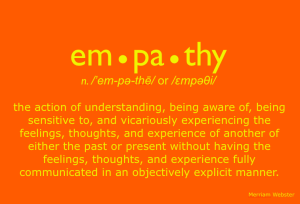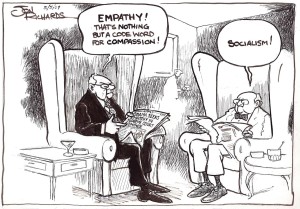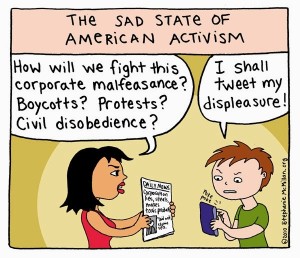I’ll never forget something I learned in my high school debate class. My teacher, Ms. Chamberlain (or PC as we all call her), said, “The greeting card companies have it all wrong. Unless we have had a loved one die, we should be sending empathy cards instead of sympathy cards. Unfortunately they don’t sell empathy cards. Sympathy means you understand exactly what that person is going through, because you’ve experienced it yourself. Empathy is for those who are going through something you have not experienced in your own life.”
***editor’s note- after further research, it appears she may have been mixed up about which word had which definition, or in my 16 year old head I may have gotten them reversed. *****
That statement has stuck with me over the years. We often like to interchange these words, but the truth is, they are very different. While it is always nice to have someone who has been in your situation to talk to, to support you, the more difficult act of compassion is the one that doesn’t come naturally to us, the one that requires us to look beyond our own life and feelings and allow for others’.
I had always thought of sympathy as pity, or feeling sorry for someone, while empathy was just the emotionally detached version of sympathy.
A few months back I wrote a blog about being a black and white thinker and my struggle to empathize. http://kbjackson.com/zero-shades-of-grey-confessions-of-a-black-and-white-thinker/
Once you are aware of a personal shortcoming, it’s interesting how many opportunities arise to challenge you to overcome it or succumb.
While I can only speak for myself, I will say I believe this is a systemic cultural problem in white America- we do not empathize well. I do not empathize well.
For you see, what happens when we are unable to empathize with others, is we begin to dehumanize them.
I’m about to confess some pretty wretched stuff.
As a white American woman who grew up in a comfortable middle class home, there are certain privileges I have enjoyed without really understanding that they were privileges. That’s the thing about systemic white American privilege- it is so much a part of who we are, we don’t even recognize it exists. That is, until someone threatens it.
Occasionally I will have brief moments of clarity where it will strike me that while I lie comfortably in my bed, my belly full of food, secure in my neighborhood, there are people lying on straw mats on the ground, people starving, people in fear, surrounded by gunfire and war.
And then I banish those thoughts because they are too foreign to comprehend and too awful to dwell on.
There have been times where people have expressed the difficulties in their lives and my thoughts and or words have been, “You just need to try harder.” Because, after all, if life is working for me, why shouldn’t it work for everyone?
And there are stories I read about or see on the news from around the world, and yet I am unable to bring myself to invest because I am disconnected from those who are different than me, who speak a different language, whose religions and cultures I don’t understand. Those who don’t look like me.
When Malaysian flight 370 disappeared, I noticed an interesting trend in the wall-to-wall media coverage. While the majority of the people on that plane were Chinese, the two people who were interviewed and highlighted time and again were the wife of the Australian businessman and the girlfriend of the American.
Why is that?
I believe it is because we empathize more with those families than we do with the Chinese. I’m not even saying it’s out of blatant racism, so much as an inability to connect culturally. We don’t speak their language, and they don’t look like us.
Hundreds of Korean high school students drown in a horrific ferry sinking. That merited 2, maybe 3 days of coverage on CNN. Few, if any, interviews with the families. We don’t speak their language, and they don’t look like us.
A white high school student stabs several kids at a suburban high school. Our first thoughts go to our own children, and how safe they are at their own schools. Those victims look like our kids. They sound like our kids.
More than 200 Nigerian school girls are kidnapped and sold into slavery. It takes weeks for the media to take notice, and when they finally do, it’s as a result of a hashtag campaign, #bringbackourgirls. Those who tweet and post about this story, including Michelle Obama, are maligned for useless efforts and painted as narcissists who don’t really care, but want to feel like they have done something.
Maybe there’s some truth to that. We are lazy in our activism. We are apathetic and our morality is often in direct proportion to our comfort level.
I saw a cartoon that showed a man standing at a greeting card counter. He was telling the clerk, “I need an Empathy/Apathy card- one that says I understand but I don’t care.”
When I first heard about the kidnappings in Nigeria, I must admit my deep-rooted American ethnocentrism reared its ugly head.
The following are some of the grotesque thoughts that flitted through my mind:
It’s Nigeria. I will bet stuff like that happens all the time.
Those people are used to suffering, to corruption, to struggle.
They are used to loss, to burying their loved ones. It’s probably not as traumatic for them.
I know, I told you it was gross. It’s not how I really feel. It’s not how I WANT to feel. But this is what a lack of true empathy does- it diminishes the value of other people.
A lack of empathy has guided American policies on human rights, on foreign relations and on war since before we were the United States of America.
A lack of empathy enabled the enslavement of twelve million Africans. It is enabling 20-30 million people to be in bondage worldwide TODAY.
Back in 2002 we were living in a suburb of Salt Lake City when news broke of the kidnapping of Elizabeth Smart. Young, pretty, white, wealthy.
At the time, my daughter Sydney was just a few years younger, also pretty and blonde.
The kidnapping from her own bedroom in her nice home, just a few miles from our house, of a girl who looked like she could be my daughter- THAT was something I could empathize with.
We seem to have a very shallow idea of empathy.
Empathy isn’t only the attempt to put ourselves into the shoes of someone LIKE us. It is the attempt to put ourselves into the shoes of anyone for the purpose of understanding their grief and pain.
We don’t like that. That’s icky. That means acknowledging the suffering of the world on a deeper, personal level.
That means believing each and every single life on this planet has equal value, and acting on that belief; Regardless of color, nationality, language, religion.
That means EVERY child kidnapped around the world is worth the efforts to recover them, not just the pretty white ones. Not just the Madeleine Mccanns, the Patty Hearsts, the Elizabeth Smarts.
2000 volunteers searched for Elizabeth Smart each day for MONTHS.
Did you know that there is a website called http://blackandmissing.org/ for those who don’t get the round the clock media coverage? We should ask ourselves why that is, and think very carefully before we answer, not in knee-jerk reaction.
And we need to be totally honest with ourselves- the obsession with MH flight 370 is not out of empathy for the victims and families, but because of the mystery surrounding the disappearance. 99% of the coverage was talking with experts, recreations with flight simulators and graphic maps of flight paths and search areas. There were only brief clips that showed the wailing of the grieving families.
I’m not advocating invasion of their privacy, but stoic interviews with the only two white women connected to the whole tragedy does nothing towards connecting viewers to the reality of what this has been like for those left behind, wondering. Their wives, husbands, parents and children mean just as much to them as ours do to us.
Do we really believe that though? It doesn’t seem so.
There are nearly a billion and a half people in China.
There are nearly a billion and a half people in India.
There are over a billion people in Africa. (23 million of whom are living with HIV while the world does very little- a whole other topic for another day)
Those large amounts obscure and minimize the value of each person in those nearly 4 billion people. Each human being who is created by God in His image. Each human being with real hopes, dreams, feelings, pain. Until we see them that way, we will never be able to empathize.
Child soldiers. Human trafficking. Famine. Drought. Endless war.
It’s almost beyond our comprehension.
Empathy is not supposed to be just a pat on the back of “poor you, glad it’s not me.”
Empathy should change the way we think, feel and act.
I am the first to admit that I completely suck at this. It doesn’t come naturally to me.
I’m a pretty guarded emotional person, and deep down I know that to empathize means to enter into that person’s struggle with them. That is terrifying to me. I feel a longing towards missionary work and an aversion to what I know it will do to my heart.
I’ve long lived comfortable, convenient morality, the foundation of hashtag activism. The more I allow reality in,and the more I attempt to empathize, the more I come face to face with my own biases, my intuitive dismissal of other’s life experiences, my inability to enter in to their struggle emotionally or physically.
I believe the only solution to a lack of empathy is to recognize our privilege, to make real attempts to understand where others are coming from, and to get to know people from all parts of the world, from different cultures, with different life experiences. We need awareness, even if it comes in the form of a hashtag campaign, and then we need to follow it up with action. No more “Oh that’s too bad,” *Tweet Tweet* and then moving on unaffected.
Every person I have known who has worked with children in need, worked with communities in need, done missions trips, held orphans, prayed with girls who were sold into sex slavery, built dwellings for those with no homes- EVERY ONE OF THEM say that the experience may have benefitted those it was intended to help, but it also changed them to their core. Forever.
As much as I enjoy my comfort, I know I was made to do more, and that the greatest rewards in this life come from serving others.
My prayer today for myself and for our country is that we develop compassionate truly empathetic hearts that spur us on to real action. Patriotism is great, but not if it comes at the expense of seeking to understand the hearts and needs of the world around us. We have a moral obligation to take care of each other, not just the ones who look like us.






brilliant! I’m very proud of you!